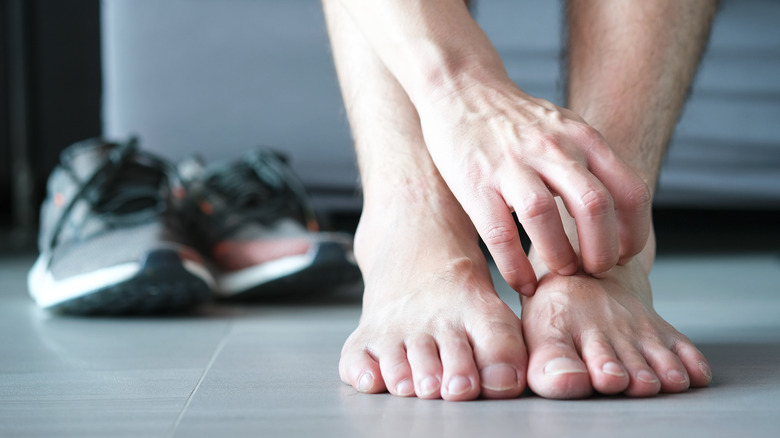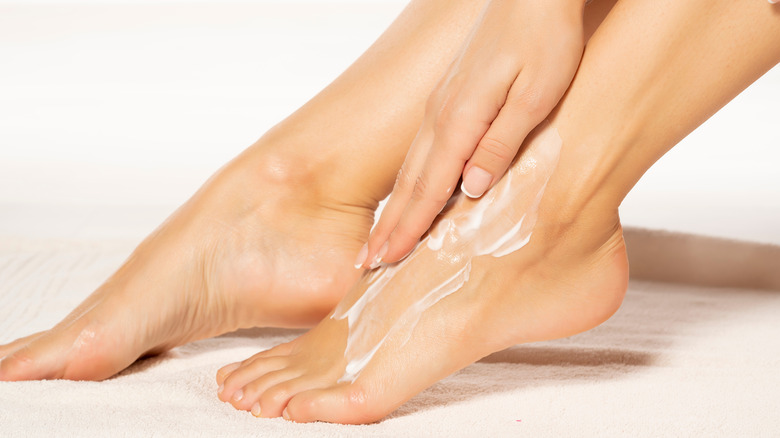What It Really Mean When Your Ankles Itch
Itching is a common condition that can happen on various parts of the body, including the ankles. However, many of us are usually clueless about what it really means when the ankles itch. A 2015 study published in the journal American Family Physician notes that itching, also called pruritus, has various causes and symptoms. Another 2019 study published in the Journal of Clinical and Aesthetic Dermatology reiterates that, even though pruritus is common and often appears unexplained, it occurs with numerous dermatological conditions, making it a symptom rather than a cause. Although a benign symptom, it's also an indicator of systemic diseases, according to the study.
Medical News Today further notes that itchy ankles are also characterized by rashes or lesions which worsen with time and frequent itching. According to the source, when lesions don't accompany itchy ankles, you might have another condition known as "essential pruritus," a more critical form of pruritus. Adverse effects of itching on your well-being can range from mild to severe and incapacitating. It's crucial to understand the cause and communicate symptoms to your doctor if they worsen.
Possible causes of itching on the ankles
According to Cleveland Clinic, eczema is a common cause of itchy ankles and affects about 15 million Americans. It's characterized by redness and itchiness on various body parts, including the ankles. Healthline also outlines various underlying conditions which can make your ankle vulnerable to mild to severe itches. For example, diabetes (caused by high levels of sugar in the bloodstream) can lead to itching on various parts of your body, including your ankles. The same applies to autoimmune conditions like lupus and rheumatoid arthritis, which can attack the cells in your ankles. Other conditions that cause itchy ankles include contact dermatitis, allergies, hives, fungal infections, dry skin, and cellulitis. Patient.info describes cellulitis as a bacterial infection of the skin, which can make the ankles itch.
According to WebMD, various medications can also cause the skin to itch. They include drugs like penicillin-based antibiotics, sulfa drugs, anticonvulsants, nonsteroidal anti-inflammatory drugs (NSAIDs), and chemotherapy. These can lead to allergic reactions, including leg itching, per WebMD. Generalized itching can also occur as a side effect of a medication or cancer treatment, Cancer Research UK. The source further explains that itching can also occur when the body reacts to substances released by the tumor. And even though the itching can occur anywhere on the body, it's often worse on the legs or arms, per Cancer Research UK.
Various treatment options for itchy ankles
Many people choose to apply creams to areas of the skin that are itching, However, if it's linked to an underlying condition like diabetes, you may not get a satisfactory result. For this reason, it's crucial to involve a dermatologist or health expert beforehand. If the cause of itching results from diabetes, Healthline recommends taking your diabetes medication according to your doctor's instructions, eating a balanced diet, and exercising regularly to stabilize blood glucose levels enhance blood circulation, and promote healthy nerves.
For people experiencing itching caused by cancer or cancer treatments, the American Cancer Society advises avoiding tight shoes or socks, using skin creams that don't contain alcohol, and applying lotions after a warm bath when the skin is damp.
For generalized itching on the legs, WebMD advises applying an ice pack or anything cold to the affected area, taking a colloidal oatmeal bath, keeping the skin hydrated, and applying creams with short-term relief ingredients like pramoxine. For itching caused by autoimmune conditions, it would be best to speak to your doctor to understand the best way to manage the condition.



